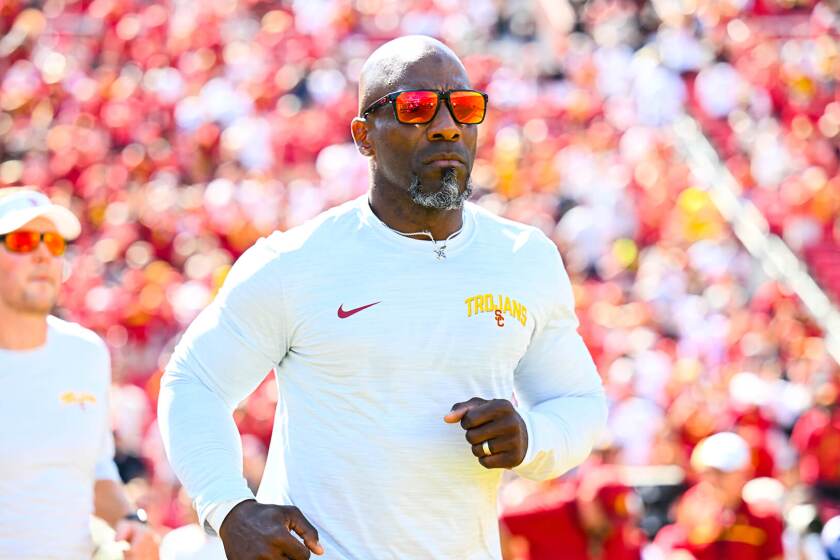Pac-10 coach broke rules, NCAA says
- Share via
A Pacific 10 Conference head coach has been found in violation of NCAA rules for retaining a paid consultant to attend practices and watch games — circumstances identical to those surrounding former USC football coach Pete Carroll’s hiring of an NFL veteran to help with the Trojans’ punting and kicking teams — according to an internal Pac-10 report.
The document does not name the coach or the sport, but the Pac-10 sent it to the conference’s schools after The Times reported last summer that Carroll had quietly employed Pete Rodriguez to monitor practices and games throughout the 2008 season, in apparent violation of NCAA limits on the number of coaches each team may hire.
A USC spokesman would not confirm or deny that the Pac-10 report referred to the Carroll-Rodriguez relationship.
“We’re choosing not to discuss the issue,” said James Grant, an assistant vice president of the school.
Carroll and USC Athletic Director Mike Garrett also declined requests to confirm or deny that the report addressed the school’s employment of Rodriguez. Now head coach of the NFL’s Seattle Seahawks, Carroll said last summer that his hiring of Rodriguez was proper.
The Pac-10 report grew out of a December meeting of the conference’s enforcement committee. It details numerous other violations across a range of sports at member schools, many dealing with minor recruiting violations.
USC is awaiting the outcome of a broader NCAA investigation into its athletic programs, which has focused on alleged illicit payments to two players. The school has maintained a near-silence about the probe.
The NCAA is believed to be examining whether USC lost “institutional control” of its athletics department. If that finding is made, the NCAA could strip the school of sports scholarships, television appearances, post-season eligibility and previous victories.
The Pac-10 report, a copy of which was obtained by The Times, says the “NCAA determined that a consultant could not attend practices on a regular basis in any type of paid capacity or review game films without being counted in the coaching limits.”
As a penalty, the report says, the head coach was issued a letter of admonishment and a rules review session was held.
A person familiar with Pac-10 enforcement procedures, who asked to remain anonymous because he is not authorized to speak publicly, said letters of admonishment are typically issued by the school and the rule violations are referred to the NCAA.
The names of schools and personnel are routinely omitted from the periodic reports because the documents are designed to be a “teaching tool” for athletic departments, not a punitive instrument, said the person who is knowledgeable about Pac-10 operations.
A Pac-10 official would not comment.
The wider NCAA probe of USC dates to 2006, when allegations surfaced that former football star Reggie Bush and his family received thousands of dollars in housing benefits and other payments from two would-be sports marketers. Bush has said he and his family did nothing wrong.
Similar accusations were later made involving former basketball standout O.J. Mayo, whose agent denied them. Eventually, the Mayo scandal was followed by the resignation of Coach Tim Floyd, and USC imposed its own sanctions on the basketball program, including disqualifying the team from this year’s NCAA tournament.
Meanwhile, The Times reported that the school was investigating former football tailback Joe McKnight’s use of a Land Rover owned by a Santa Monica businessman. As a result, McKnight was withheld from the Emerald Bowl in December.
Carroll, who left USC in January, tried to distance himself from the NCAA investigation during his final years at the school, although he appeared before an NCAA infractions committee in February. It is not known whether the panel asked him about Rodriguez.
An NCAA spokeswoman would not answer questions about USC. Generally, she said, the association is free to accept a school’s self-imposed penalty as sufficient or require further punishment.
NCAA bylaws prohibit consultants from participating “in any on- or off-field or on- or off-court coaching activities” unless they are counted against the coaching cap. The rules specifically bar consultants from “attending practices and meetings involving coaching activities, formulating game plans [and] analyzing video involving the institution’s or opponent’s team.”
The bylaws say teams may retain temporary consultants “to provide in-service training for the coaching staff, but no interaction with student-athletes is permitted.”
The rules restrict teams in USC’s division to nine assistant coaches and two graduate assistants. In 2008, Carroll decided not to assign an assistant coach full time to special-teams duty, overseeing the punting and kicking squads. Rodriguez was never listed on the coaching roster.
A highly regarded tactician who has worked for the Seahawks, Jacksonville Jaguars and Washington Redskins, Rodriguez said in an interview last summer that he did not coach players or analyze film, but attended practices and “basically watched all the games.” He said he advised Carroll on individual players’ performances, telling him “this guy needs this and this.”
He recounted Carroll saying “we have to be very careful” about the arrangement because of the NCAA rules.
After The Times report appeared, Carroll said Rodriguez’s employment had been within the rules and had been cleared in advance by USC’s NCAA compliance office.
“Everything was all right,” he said.
More to Read
Go beyond the scoreboard
Get the latest on L.A.'s teams in the daily Sports Report newsletter.
You may occasionally receive promotional content from the Los Angeles Times.







